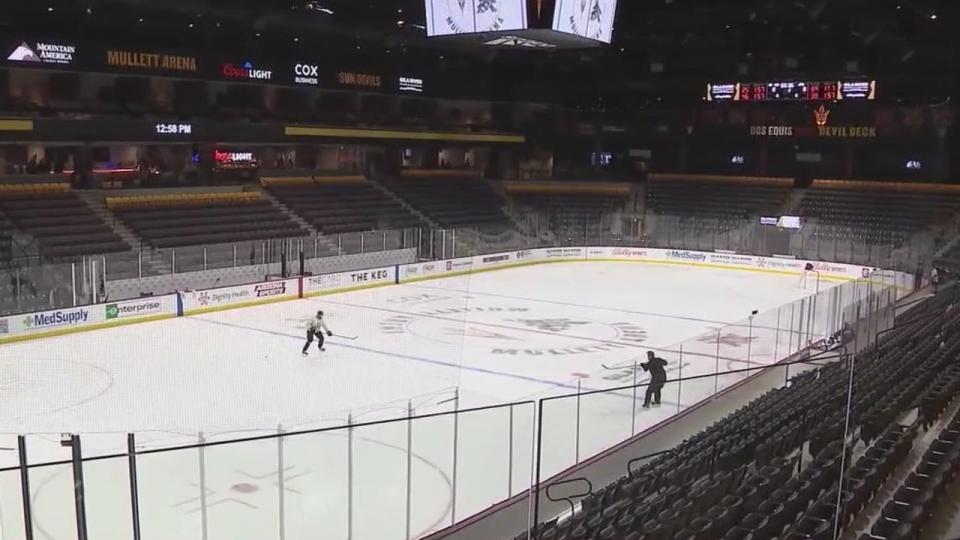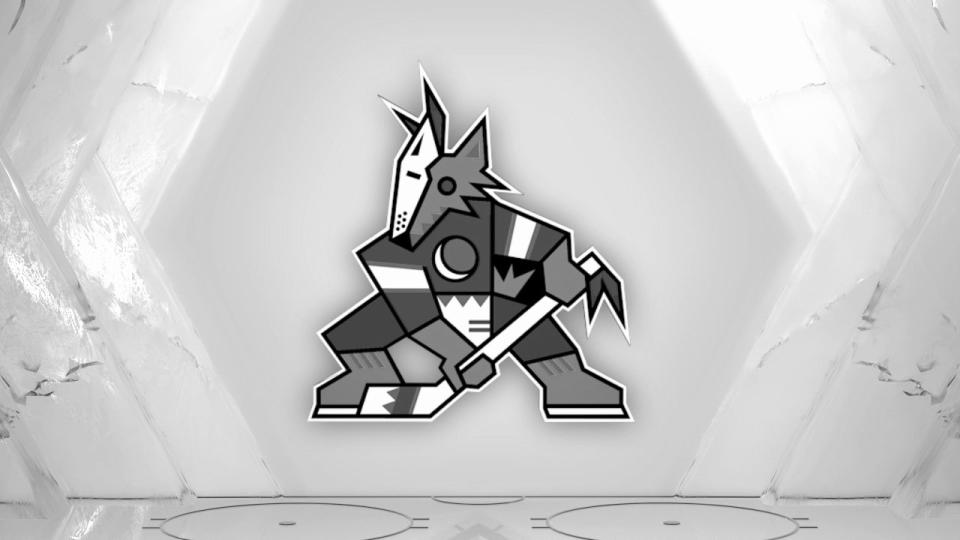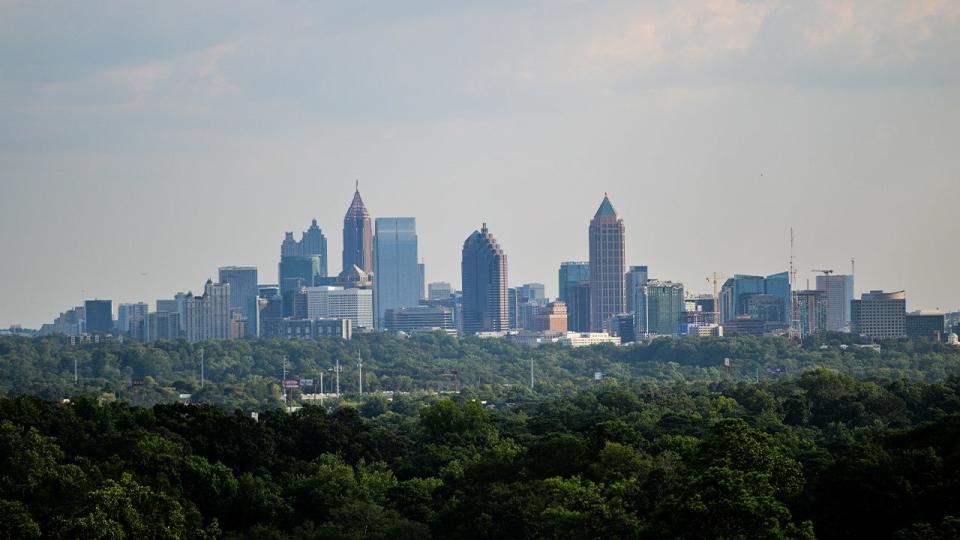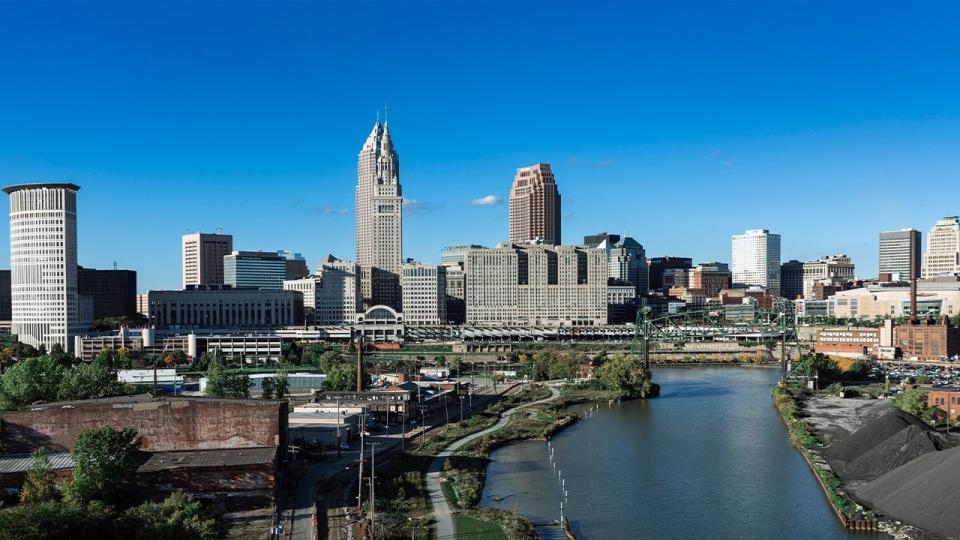Arizona Coyotes: What Atlanta, Cleveland and Seattle's experiences could tell us about the move's aftermath
PHOENIX - It has been rumored for quite some time, and it is now official: the Arizona Coyotes, at least in its current form, is no more as the team moves to Salt Lake City, Utah.
With the announcement, Phoenix now joins a list of American and Canadian cities that have lost professional sports franchises, including Atlanta, Cleveland, and Seattle.
Each city had a different experience with losing a sports franchise, and their experiences could give people in Arizona a look at what lies ahead for the Phoenix area.
Here's what to know.
How did Arizona lose the Coyotes?

A factor in the now-former Coyotes' relocation appears to be Mullett Arena, a 5,000-seat venue located on Arizona State University's campus in Tempe. For the past two seasons, the now-former Coyotes played at the venue.
"It is simply unfair to continue to have our players, coaches, hockey front office, and the NHL teams they compete against, spend several more years playing in an arena that is not suited for NHL hockey," a portion of Meruelo's statement read.
What does the deal entail?

According to a statement released by NHL officials on April 18, a new franchise will be established in Utah, beginning with the 2024-2025 season.
"Effective at closing, the approved transactions will result in the Coyotes’ franchise transferring the totality of its existing hockey assets – including its full Reserve List, roster of players and draft picks and its Hockey Operations Department – to the Utah franchise," read the statement.
Per the statement, the now-former Coyotes will be deemed an inactive franchise, and should the now-former NHL team's owner, Alex Meruelo, fully build "a new, state-of-the-art facility appropriate for an NHL team within five years," the team can then be reactivated.
How many cities have lost a sports franchise?
As mentioned above, there are a number of U.S. and Canadian cities that have lost professional sports franchises.
Cities that have lost professional sports franchises include larger ones like Atlanta and Seattle, and smaller communities like Hamilton and Quebec City, both of which are located in Canada.
What happened after these cities lost their franchise?
For many of the cities, their experience post-franchise loss differed.
Broadly speaking, some of these cities eventually got a franchise team back, even if that happened many years later.
Meanwhile, some cities that have lost a franchise team are still waiting for a second chance.
In this article, we will take a look at the different experiences Atlanta, Cleveland and Seattle had when it comes to franchise loss.
Atlanta: Lost a franchise, regained it, and lost it again

Atlanta is not a city that lacks options when it comes to pro sports: the city has an MLB team (the Braves), a Major League Soccer team (the Atlanta United), an NFL team (the Falcons), an NBA team (the Hawks), and a WNBA team (the Dream).
Noticeably missing from that current lineup, however, is an NHL team. The city had two NHL teams in its history, but both eventually moved elsewhere.
According to an AP article from March 2024, Atlanta was home to the Flames from 1972 to 1980, and the Thrashers from 1999 to 2011. The article states that both teams have moved to Canada, with the Flames having moved to Calgary, located in Alberta province. The Thrashers moved to Winnipeg, which is located in Manitoba province.
Winnipeg, per The Canadian Encyclopedia, was the home of an earlier NHL team that was also called the Jets. That team suffered from rising operating costs, impacts from player salaries, and a weakened Canadian Dollar in the 1990s, and eventually became the Arizona Coyotes that people knew for many years.
The Canadian Encyclopedia stated that prior to them becoming the second Winnipeg Jets, the Thrashers had poor performance and poor game attendance.
For the Flames, the encyclopedia noted that rising operating costs, along with a decline in ticket sales, led to the team's owner selling the franchise, ultimately leading to its relocation to Calgary.
The Thrashers have left Atlanta for over a decade, but the AP reported in March that former NHL player Anson Carter is leading a group that made a formal request to the NFL to start the process of adding an expansion team in the Atlanta area.
Atlanta's quest for a third NHL team in the city could hinge on what happens in Arizona: the AP report states that the NHL is "unlikely to move forward on expansion" until the arena situation involving the now-former Coyotes is resolved.
Cleveland: Setting a precedent for other leagues to follow

The deal for the now-former Arizona Coyotes shares a certain degree of similarity to a deal that resulted in the first iteration of the NFL's Cleveland Browns leaving the Ohio city.
According to the Encyclopedia of Cleveland History, which is housed on the website for Case Western Reserve University, the owner of the first Browns, Art Modell, announced in late 1995 that the team would move to Baltimore.
The move, per the encyclopedia entry, was announced before Cleveland could propose an offer to keep the Browns. Meanwhile, voters had approved a renovation of the Cleveland Municipal Stadium that November.
Per an opinion piece published on the news website cleveland.com in March 2024, Cleveland, in the aftermath of Modell's announcement, filed a lawsuit against the NFL and Modell in a bid to keep the team in the city.
Ultimately, the opinion piece stated that the NFL had two options with regard to the first Browns. One option would have an NFL trust operate the team until a new stadium was built in Maryland, after which Modell could reassume the team's ownership and move the team to Baltimore, with Cleveland being awarded an NFL franchise.
The other option, according to the opinion piece, would have Modell immediately move the team to Baltimore, and Cleveland being guaranteed a new NFL franchise by the year 1999. At the time the move was announced, 1999 was roughly three years away.
In an article published by the AP in February 1996, it was stated that the NFL and the City of Cleveland ultimately agreed on a deal that would allow the first Browns to move to Baltimore, but the name ‘Browns,' along with the team's traditional colors, would remain in Cleveland, and be used by a future NFL team in Cleveland. The old team's records and statistics would also remain in Cleveland.
In March 1998, the NFL approved an expansion team for Cleveland, paving the way for the second Cleveland Browns. The original decision to move the team, however, reportedly led to Modell becoming a pariah in Ohio. In fact, in the aftermath of Modell's death in 2012, his son, David, asked the new Cleveland Browns to not do anything to recognize the late owner due to the level of vilification that came following the move.
A faculty blog article published on the Marquette University Law School's website in 2012 states that the deal allowing for the first Cleveland Browns to relocate paved the way for similar agreements in the future.
Seattle SuperSonics: Still waiting for a 2nd run over a decade later

The largest metro area in the State of Washington offers a glimpse into the reality hockey fans in Arizona could face in the years (or decades) to come.
At one point, the Seattle area was home to an NBA team: the SuperSonics. However, a relocation to Oklahoma City was approved by NBA owners in 2008.
According to reports at the time from Tulsa, Okla. television station KOTV, the decision to move prompted a number of controversies, including accusations made by the team's former owner, Howard Schultz, that the team's new owner at the time, Clay Bennett, "did not make a good-faith effort to secure a new arena deal as he promised when he bought the team in 2006." The allegation was refuted by Bennett, however, who said he "'held to the commitment' of keeping the Sonics in Seattle and that he operated in good faith."
In a 2023 report by KOTV, it was stated that the Sonics' move to Oklahoma came after a successful ballot measure that "made it next to impossible to spend taxpayer money on a new arena." Efforts to secure a deal with Washington state legislators also went nowhere.
Similarly to the Cleveland Browns deal, the new owner and the City of Seattle agreed that the team will allow Seattle to "retain the rights to the SuperSonics' name, logo and team colors." However, sports website Deadspin noted in February that the OKC Thunder has ‘an awkward relationship with the Sonics lineage,’ with the team ‘incorporating and acknowledging some elements’ such as retired jersey numbers while ‘rightfully ignoring others,’ like the Sonics' 1979 championship.
As of 2024, the Seattle area still does not have an NBA team. While there was a bid to bring pro basketball back to Seattle by way of moving the Sacramento Kings, the efforts failed in 2013.
However, it appears there is still an appetite to bring the NBA back to Seattle.
In 2022 and 2023, preseason NBA games were played in the Seattle area, with the games being played at an arena now known as ‘Climate Pledge Arena,’ which was also the former home of the Sonics.
Meanwhile, Seattle Mayor Bruce Harrell stated in his 2024 State of the City Address that part of his plans for the city's downtown area involves bringing back the Sonics.
"NBA teams are already choosing to play pre-season games here, and that’s a clear sign that Seattle Center and Climate Pledge Arena are ready for NBA action. We stand ready to do whatever it takes to bring back the green and gold," a portion of the address read.

